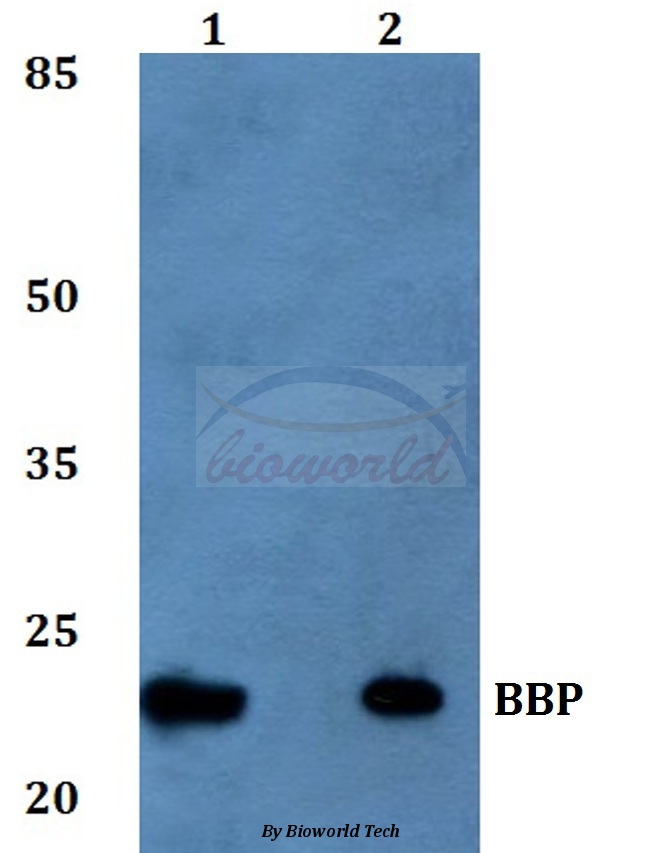Product Name :
BBP polyclonal antibody Background :
Proteolytic cleavage of the Amyloid protein precursor (APP) gives rise to the β-Amyloid and Amyloid A4 proteins, which are present in human platelets. Amyloid deposition is associated with type II diabetes, Down syndrome and a variety of neurological disorders, including Alzheimer’s disease. Proteolytic cleavage of APP leads to the formation of the Amyloid β/A4 Amyloid protein. This protein is involved in the formation of neurofibrillary tangles and plaques that characterize the senile plaques of Alzheimer’s patients. BBP (Beta-amyloid-binding protein), also known as TM2D1 (TM2 domain-containing protein 1), is a 207 amino acid multi-pass membrane protein containing a G protein-coupling module that allows for interaction with the β-amyloid peptide of APP. In cell culture, expression of BBP induces caspase-dependent vulnerability to β-amyloid peptide toxicity, suggesting that it is a target of β-amyloid and may be involved in the molecular pathophysiology of Alzheimer’s disease. Product :
Rabbit IgG, 1mg/ml in PBS with 0.02% sodium azide, 50% glycerol, pH7.2 Storage&Stability :
Store at 4°C short term. Aliquot and store at -20°C long term. Avoid freeze-thaw cycles. Specificity :
BBP polyclonal antibody detects endogenous levels of BBP protein. Immunogen :
A synthetic peptide corresponding to residues in Human BBP. Conjugate :
Unconjugated Modification :
Unmodification
BBP polyclonal antibody Background :
Proteolytic cleavage of the Amyloid protein precursor (APP) gives rise to the β-Amyloid and Amyloid A4 proteins, which are present in human platelets. Amyloid deposition is associated with type II diabetes, Down syndrome and a variety of neurological disorders, including Alzheimer’s disease. Proteolytic cleavage of APP leads to the formation of the Amyloid β/A4 Amyloid protein. This protein is involved in the formation of neurofibrillary tangles and plaques that characterize the senile plaques of Alzheimer’s patients. BBP (Beta-amyloid-binding protein), also known as TM2D1 (TM2 domain-containing protein 1), is a 207 amino acid multi-pass membrane protein containing a G protein-coupling module that allows for interaction with the β-amyloid peptide of APP. In cell culture, expression of BBP induces caspase-dependent vulnerability to β-amyloid peptide toxicity, suggesting that it is a target of β-amyloid and may be involved in the molecular pathophysiology of Alzheimer’s disease. Product :
Rabbit IgG, 1mg/ml in PBS with 0.02% sodium azide, 50% glycerol, pH7.2 Storage&Stability :
Store at 4°C short term. Aliquot and store at -20°C long term. Avoid freeze-thaw cycles. Specificity :
BBP polyclonal antibody detects endogenous levels of BBP protein. Immunogen :
A synthetic peptide corresponding to residues in Human BBP. Conjugate :
Unconjugated Modification :
Unmodification
-
 Western blot (WB) analysis of BBP polyclonal antibody at 1:500 dilution Lane1:MCF-7 whole cell lysate Lane2:Mouse kidney tissue lysate
Western blot (WB) analysis of BBP polyclonal antibody at 1:500 dilution Lane1:MCF-7 whole cell lysate Lane2:Mouse kidney tissue lysate
Bioworld Biotech only provide peptides for our antibodies and do not provide additional peptide customization services.
Price/Size :
USD 368/1mg/vial
Tips:
For phospho antibody, we provide phospho peptide(0.5mg) and non-phospho peptide(0.5mg).Describe :
Blocking peptides are peptides that bind specifically to the target antibody and block antibody binding. These peptide usually contains the epitope recognized by the antibody. Antibodies bound to the blocking peptide no longer bind to the epitope on the target protein. This mechanism is useful when non-specific binding is an issue, for example, in Western blotting (WB) and Immunohistochemistry (IHC). By comparing the staining from the blocked antibody versus the antibody alone, one can see which staining is specific; Specific binding will be absent from the western blot or IHC performed with the neutralized antibody.Formula:
Synthetic peptide was lyophilized with 100% acetonitrile and is supplied as a powder. Reconstitute with 0.1 ml DI water for a final concentration of 10 mg/ml.The purity is >90%,tested by HPLC and MS.
Storage:
The freeze-dried powder is more stable. For short time at 2-8°C. For long term storage store at -20°C.
Note :
This product is for research use only (RUO only). Not for use in diagnostic or therapeutic procedures.
 BBP polyclonal antibody
BBP polyclonal antibody  Datasheet
Datasheet COA
COA MSDS
MSDS SHIP
SHIP